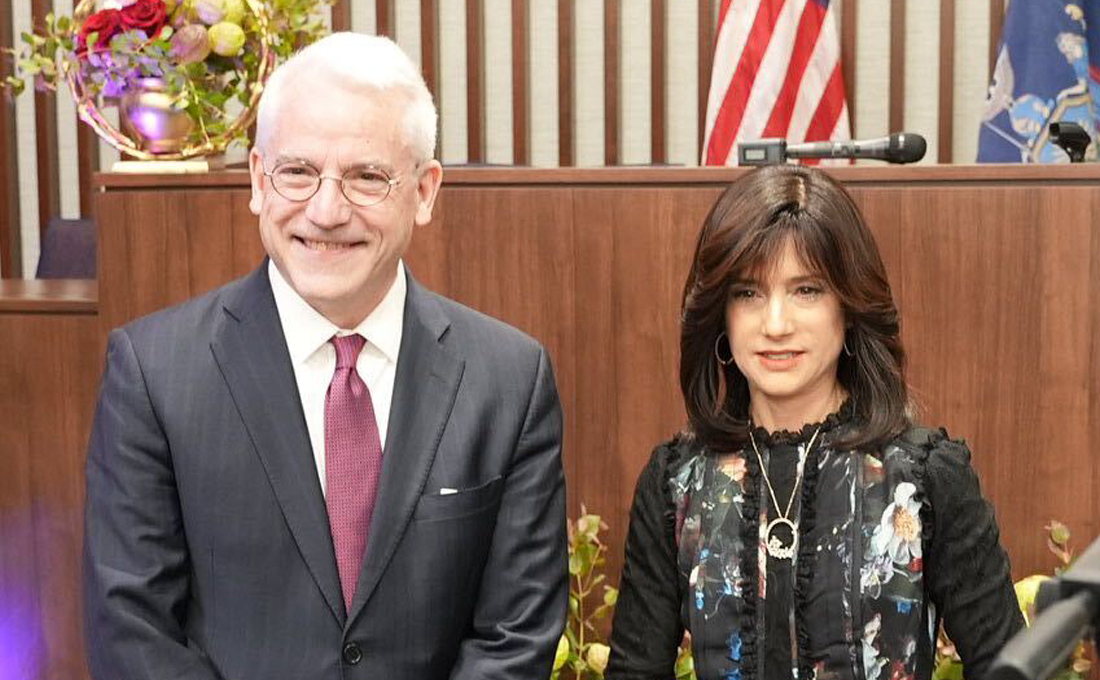Hon. Rachel Freier ’05 Celebrates Supreme Achievement at Brooklyn Law Swearing-In Ceremony

By Teresa Novellino
When Hon. Rachel Freier ’05 officially became the first Hasidic female justice to serve on the New York Supreme Court, it was only the latest in a career of barrier-shattering achievements.
It is uncommon for women in the ultra-Orthodox community to attend law school, let alone become a prominent elected official or judge. When the Brooklyn native was elected to be a judge of the Civil Court of the City of New York in 2017, she was the first Hasidic woman elected to public office in the United States. Since then, no others have followed.
In an interview Tuesday in her chambers, Freier reflected on the journey that led to the Nov. 15 ceremony, proudly hosted by Brooklyn Law School in the school’s Moot Court Room, which was packed with well-wishers. It meant a lot to hold the event at the school, Freier said. Among the display of mementos from a lifetime of community activism and legal work are her Law School yearbook and a graduation photo with her uncle and mentor, Hon. David I. Schmidt ’82. In her first appointment as judge, she was elected to replace him on the bench after he retired.
Freier started her career in law as a legal secretary at a large law firm, balancing work and family life as a married mother of three with another child on the way. A milestone birthday prompted her to reflect on her career path.
“It was the year I turned 30, and all of a sudden I realized that I'm the secretary, and the new lawyers coming in are younger than I am, and I'm working for them,” Freier said. “I could do the job they're doing.”
In the Hasidic community, attending college was not common, especially for women, but that had begun to change as colleges catering to the Jewish community opened in the New York City area. In 1995, she enrolled in one such institution, Touro College, which held separate classes for men and women and accommodated observation of the Sabbath and religious holidays.
It took Freier six years to graduate, and she did so in defiance of the many “naysayers who said it’s never going to happen, with you working and with little babies in the house,” she said. “But, once in college, I loved every minute of it. I was not going to rush. I was going to do it my way, take it slowly. I loved every class. I loved the professors, and then by the time I graduated, all my six children had been born.”
With a full house, and degree in hand, her next step was applying to Brooklyn Law School. After being accepted to the school, she explained her responsibilities at home, and “I felt like people really cared,” she said. Carol Ziegler, then associate dean for student affairs, helped Freier enroll in two summer classes and guided her through the first year, known to be the hardest. It was Freier’s first time learning in a classroom alongside men and women, and she had an entirely different life experience from her peers.
“Most of the students that were there didn’t have a care in the world, didn't have to worry about going to the pediatrician or cooking for the holidays,” she said. “There was just no responsibility other than law school.”
At one point, while sitting in the student lounge, feeling overwhelmed, she made a pact with God. Let her get through Law School, without compromising her religious values, and “when your children come to me for help, I will help them,” she said. “And God wasted no time in testing me right after I graduated.”
One of her first acts of community service was to help at-risk youth in the Hasidic community, struggling with drugs, emotional problems, or family issues, among others. Another, and one of Freier’s proudest achievements is founding the all-woman volunteer EMT agency, Ezras Nashim, which operates in Borough Park, Brooklyn, and was created for women who, out of modesty, did not wish to rely on the all-male EMT. She is also a licensed paramedic and continues to volunteer.
“By nature, I'm a born advocate,” Freier said. “I’m always out there fighting for social justice asking, ‘What must be done?’ and if something has to be changed, I always think I have to do it.”
The ceremony included Hon. Attorney General Letitia “Tish” James, who accepted Freier’s request to swear her in. As Freier repeated the vow to serve “according to the best of my ability” the symbolism of the moment for the two Brooklyn-born women was clear. When James was elected in 2018, she was also a first: no other woman of color had, to that point, held a statewide office in New York or was elected Attorney General.
“Justice Freier earned her role on this bench, like me. We had to scratch and crawl and fight for everything we had,” James said. “Nothing was handed to her, and nothing was handed to me. And that’s why tonight is so special.”
Freier very intentionally made sure that her induction was inclusive, honoring her supporters from the political community, family, and friends alike and that it provided a positive glimpse at her community, which is often misunderstood. Among the many in the crowd witnessing the swearing-in were three Holocaust survivors, including her 100-year-old father-in-law and 99-year-old aunt. She invited Hasidic boys' choirs to perform songs that were popular with different Hasidic groups. Ezras Nashim volunteers, in uniform, were also part of the celebration.
Because females cannot sing in front of males, under the rules of her faith, she gave the women, including her daughter and granddaughter speaking roles instead.
“I wanted to show that even though we have rules, there's room for everyone,” Freier said.